|
The IIOE Global Partner Summit on
Higher Education Transformation in the Era of Artificial Intelligence Opened in
Shenzhen
Original UNESCO ICHEI 2023-12-07
23:54 Published in Guangdong
Artificial intelligence has
brought new opportunities to higher education, but also challenges such as
academic integrity risks, technological abuse, and the deepening digital
divide. Based on this background, from December 7th to 9th, 2023, under the
guidance of the Secretariat of the National Committee for UNESCO in China, the
IIOE Global Partnership Summit on "Higher Education Transformation in the
Era of Artificial Intelligence" was organized by the UNESCO Institute of
Educational Information Technology (IITE), the UNESCO Center for Higher
Education Innovation (Shenzhen, China), Southern University of Science and
Technology In 2023, the IIOE rotating chairman unit, the University of Botra
Malaysia, jointly hosted the event at Southern University of Science and
Technology.
The summit invites global
education leaders, policy makers, experts and scholars, business institutions
and other stakeholders in higher education to fully share and discuss topics
such as the new opportunities brought by artificial intelligence to higher education,
how artificial intelligence drives university management, opens up channels for
teacher professional development, and how to effectively govern. About 90
overseas guests and over 100 Chinese guests from 28 countries in Asia, Africa,
Latin America, the Arab region, and Europe attended the conference, including
influential higher education leaders such as officials from multiple education
ministries, principals and vice principals of higher education institutions,
and international experts.
This summit includes seven forum
topics, namely higher education governance, higher education teacher career
development, micro certificates and university teacher career development,
university teaching innovation and practice, university management,
high-quality digital content, and innovative partnerships. The summit actively
advocates for the common goal of "effective integration of higher
education and artificial intelligence", and shares and discusses topics
such as artificial intelligence technology governance, industry education
integration, policy framework, and case sharing, jointly looking forward to the
transformative impact of good governance of artificial intelligence technology
on higher education. The summit aims to share case studies and best practices
from global partners; Share the applications of artificial intelligence in the
field of education, such as IIOE AI laboratories and iTA intelligent teaching
assistants for generative artificial intelligence, build a cooperation platform
between IIOE partner universities and artificial intelligence service
providers, and promote industry university cooperation; Release the White Paper
on Higher Education in the Era of Artificial Intelligence (Draft for Comments).
The summit is committed to building a multilateral platform for dialogue and
exchange among governments, universities, and enterprises of various countries,
promoting the sharing of international resources and local innovation
experiences among stakeholders, and jointly building a digital transformation
ecosystem for higher education.
IIOE Global Partner Network
Leading
Digital transformation of higher
education
On the morning of December 7th,
the summit held its opening ceremony, keynote speech, and forum on "Higher
Education Governance in the Era of Artificial Intelligence". The opening
ceremony was delivered by Zhan Tao, Director of UNESCO IITE, Co organizer of
the conference, and Jin Li, Director of the Innovation Center and Vice
President of Southern University of Science and Technology.
Director Zhan Tao stated that
UNESCO's mission is to guide the direction of higher education in the AI era,
bridge the digital divide, and uphold the responsibility and responsibility of
technological governance. There is no standard answer regarding the impact of
AI on higher education; The summit provides a broad platform for communication
and dialogue among all parties, which helps to gather the strength and wisdom
of all parties. The global partnership network built by innovation centers
plays an important leading role in the digital transformation and innovation of
higher education in developing countries.
Professor Jin Li, Director of the
Innovation Center and Vice President of Southern University of Science and
Technology, stated that the International Institute of Online Education (IIOE)
will further expand its global partnership alliance, increase public-private cooperation
and industry university integration, and continue to lead the digital
transformation of global higher education in the future. Since its
establishment, IIOE has established ten IIOE national centers in the past four
years to jointly build inclusive and high-quality higher education at the
national and local levels, expand the network of partner universities from
point to surface, and create a global digital higher education system. In
addition, the Innovation Center has deployed smart classrooms in more than 40
countries around the world, enhancing the construction of smart infrastructure
in developing country universities and building an important platform for
industry university cooperation.
Keynote speech
The keynote speech was hosted by
Mr. Firmin Edouard Matoko, Global Strategy Advisor of the Innovation Center and
former Assistant Director General of Africa Priority and External Relations at
UNESCO. Mr. Matoko evaluated the significance and cultural significance of new
technologies for the global transformation of higher education in the South.
With the rapid development of technology in the past decade, one-third of the
population in Africa is using digital technology to provide online and distance
education. Will human thinking abilities gradually deteriorate in the future
due to robots and algorithms? The responsibility of UNESCO is to regulate the
use of artificial intelligence technology and promote the transformation of
higher education in developing countries. In addition, higher education should
be prepared for the new generation and how to better utilize new artificial
intelligence technologies. More importantly, technology should adapt to local
cultures in different countries and better empower higher education.
Dragan Gasevic, Distinguished
Learning Analysis Professor at the School of Information Technology at Monash
University in Australia, discussed the opportunities and challenges of
artificial intelligence. On the one hand, the application prospects of
artificial intelligence in higher education are very broad. Generative
artificial intelligence technology relies on the Large Language Model (LLM),
which can support teacher teaching and rebuild the evaluation system of higher
education. However, at the same time, artificial intelligence still has many
limitations in terms of the effectiveness and accuracy of content production,
ethical ethics, technological fairness, and accessibility. Therefore, he called
for a more comprehensive and in-depth understanding and use of artificial intelligence;
We should proactively create AI that meets human needs, rather than letting
technology develop irregularly.
Zheng Nanning, a member of the
International Association of Electrical and Electronic Engineers and an
academician of the CAE Member, pointed out that AI enabling education is
redefining the value of human knowledge and ability. Education is a slow and
elegant process that moistens things silently; No matter how advanced AI
technology is, machines cannot replace human emotions and imagination, let
alone spiritual communication and intellectual enlightenment between teachers
and students. The most important thing is that teachers need to make good use
of artificial intelligence technology to cultivate and stimulate the creativity
of learners. In order to better adapt to "human-machine collaborative
intelligent education" and standardize the management and use of
artificial intelligence technology, governments and UNESCO play important roles
in governance.
Dr. Ma Yanjun, General Manager of
Baidu AI Technology Ecology and Joint Leader of the National Artificial
Intelligence Standardization Group's Large Model Special Group, shared the
integration of industry and education under the trend of large models. Given
that enterprises can provide practical content related to educational
technology, cooperation between enterprises and universities can help promote
the integration of AI technology and higher education. Enterprises need to
closely integrate with teachers, students, and universities to improve the
efficiency of teaching, research, and management work. Baidu and the Innovation
Center have accumulated important cooperation achievements such as micro
certificates, and will jointly expand their partner network in the future,
deepen cooperation with universities in more countries and regions, and inject
new vitality into the digital transformation ecosystem of higher education.
Forum 1: Global Education Leaders
Co discuss higher education
governance
Forum One "Higher Education
Governance in the Era of Artificial Intelligence" is chaired by Mr. Tang
Qian, former Assistant Director General of Education at UNESCO. Mr. Tang Qian
pointed out that the rise of artificial intelligence has driven the development
of global higher education, and UNESCO actively responds to challenges and
seizes opportunities. At the same time, artificial intelligence has brought new
challenges and opportunities to the education industry and UNESCO, which also
points the way for future development. I hope that this forum can continue to
pay attention to and support the application of artificial intelligence in the
field of higher education, and contribute to the innovation and progress of
global higher education.
Zhu Zhiting, a lifelong professor
at East China Normal University and a special advisor to the UNESCO Higher
Education Innovation Center, emphasized that "the only constant in the
world is change" with the topic of "Artificial Intelligence and
Ethics in Universities". In the era of accelerated transformation in
artificial intelligence, the development of LLM is not the end of human
exploration, but a new starting point, and more new ideas will emerge in the
future. In addition, he puts forward the following five suggestions for the
ethical construction of artificial intelligence in higher education: adhering
to the concept and practice of humanism; Establish a framework for ethical
governance in higher education through the penetration of artificial
intelligence; Establish a policy education framework for artificial
intelligence in higher education; Carry out micro professional/micro
certificate education on artificial intelligence literacy and related ethics;
Higher education should contribute to the construction of an artificial intelligence
ethical system that promotes mutual benefit between humans and technology.
Professor Mona Abdel Al Elzahry,
Executive Director of the Education Strategy Management Bureau at Ain Shams
University in Egypt, shared the effective governance framework and practices
for implementing AI in the higher education system in Egypt. She emphasized
that with the continuous development of the potential for higher transformation
in artificial intelligence, educators should maintain an open and critical attitude
towards it, ensuring that its application conforms to ethical considerations
and promotes overall well-being.
Chris Maiyaki, Acting Executive
Secretary General of the National University Council of Nigeria, shared key
initiatives of the Council to promote higher education reform and leadership
development through innovative partnerships. Mr. Maiyaki emphasized the
potential exacerbation of the digital divide in the context of digitalization,
as well as the instability of digital technology application prospects faced by
universities in developing countries. In this context, innovative and
sustainable partnerships between universities, governments, and enterprises
will effectively respond to rapid social changes, providing new paths for
university curriculum design, creating new knowledge, and cultivating talents
that meet future social needs from the perspective of mutual assistance and
trust.
Dr. Bi Xin, Chief Digital Officer
and Director of the Knowledge and Information Center at Xi'an Jiaotong Liverpool
University in China (hereinafter referred to as "Xipu"), shared
Xipu's journey in digitalization of higher education. As a partner of the
Innovation Center, Xipu actively responds to UNESCO Sustainable Development
Goal 4 by building a learning supermarket platform, promoting lifelong learning
through shared resources, systems, and infrastructure, enabling more teachers
and students to benefit from education, and looking forward to collaborating
with more overseas partners.
Round table discussion
Mr. Tang Qian had a roundtable
discussion with President Johnson Nyarko Boampong, Secretary General Yusuf
Kiranda, Vice President Kean Tak, and other experts on how to address the
challenges brought by AI to higher education.
Johnson Nyarko Boampong
President of Cape Coast University
of Ghana
Universities face digital
challenges and limitations in cultivating technical talents when using AI,
requiring the establishment of technical global partnerships and investment in
local AI development.
Yusuf Kiranda
Secretary General of Markre
University in Uganda
AI technology is developing
rapidly, but governance is relatively lagging behind, and legal regulations and
policy guarantees need to be followed up in a timely manner.
Kean Tak
Vice President of the Royal
University of Phnom Penh, Cambodia
The infrastructure and teaching
resources of universities in developing countries are limited, and AI has
enormous potential for the development of the abilities of faculty and
students. However, at the same time, it is also necessary to address potential
issues from an international cooperation perspective.
IIOE Alliance Promotion
Integration of AI and Higher
Education
In December 2019, the Innovation
Center teamed up with Southern University of Science and Technology to jointly
launch the establishment of IIOE, in collaboration with global universities and
enterprises. In 2020, against the unique historical background of the global
pandemic, the IIOE platform helped universities and teachers in developing countries
urgently respond to the challenge of offline suspension of classes. It
organized targeted multilingual online courses and training, covering content
such as cloud computing, big data, the Internet of Things, and artificial
intelligence. Since the establishment of the project, IIOE has adhered to the
concept of "consultation, co construction, and sharing", and has
cooperated with universities, enterprises, international organizations, and
other relevant parties at multiple levels and multilateral levels to jointly
build a global ecosystem to promote the digital transformation of higher
education. The four rotating chairman units have provided strong support to
IIOE, and ten IIOE national centers have played a "point to area"
regional radiation effect, driving more local universities to join the IIOE
alliance. After more than three years of development, the IIOE alliance covers
nearly 90 partner universities and various business partners, empowering more
than 10000 teachers in 135 countries worldwide, and is committed to becoming a
leader in the digital transformation of global higher education.
During the three-day conference,
the Innovation Center will continue to explore opportunities, mechanisms,
risks, governance, and support for the integration of AI and higher education.
This summit focuses on the theme of "The Transformation of Higher
Education in the Era of Artificial Intelligence" and conducts in-depth
discussions and multilateral exchanges, further exploring the practical path of
the integration of AI and higher education. This summit is committed to
consolidating the power of global multilateral cooperation and opening a new
chapter for innovation centers and global partners to reshape the future of
higher education in the AI era.
人工智能时代的高等教育变革”IIOE全球伙伴高峰会在深开幕
原创 UNESCO ICHEI UNESCO ICHEI 2023-12-07 23:54 发表于广东
人工智能为高等教育带来了新的机遇,同时也带来学术诚信风险、技术滥用、数字鸿沟日益加深等方面的挑战。基于此背景,2023年12月7日至9日,在中国联合国教科文组织全国委员会秘书处的指导下,“人工智能时代的高等教育变革”IIOE全球伙伴高峰会由联合国教科文组织教育信息技术研究所(下称“IITE”)、联合国教科文组织高等教育创新中心(中国深圳)(下称“创新中心”)、南方科技大学、2023年IIOE轮值主席单位马来西亚博特拉大学联合在南方科技大学举办。
峰会邀请全球教育领袖、政策制定者、专家学者、企业机构等高等教育利益相关方,就人工智能对高等教育带来的新机遇、人工智能如何驱动院校管理、开拓教师专业发展通道,和如何进行有效治理等议题做充分的分享和讨论。来自亚洲、非洲、拉丁美洲、阿拉伯地区、欧洲的28个国家约90位海外嘉宾和100余位中国嘉宾参会,其中包括多国教育部官员、高等教育机构校长、副校长、国际专家等具有影响力的高等教育领导者。
本届峰会包含七大论坛议题,分别为高等教育治理、高等教育教师职业发展、微证书与高校教师职业发展、高校教学创新与实践、院校管理、高质量的数字化内容、创新型伙伴关系。峰会积极倡导“高等教育与人工智能有效融合”共同目标,关于人工智能技术治理、产教结合、政策框架、案例分享等方面展开分享和讨论,共同展望人工智能技术善治对高等教育的变革性影响。峰会旨在分享全球伙伴的案例研究和最佳实践;分享人工智能在教育领域的应用,如IIOE AI实验室和生成式人工智能iTA智慧助教,搭建IIOE伙伴院校与人工智能服务供应商的合作平台,推进产学合作;发布《人工智能时代的高等教育白皮书(征求意见稿)》。峰会致力于搭建各国政府、高校、企业对话交流的多边平台,促使各利益相关方分享国际资源及各国本土化创新经验,共同打造高等教育数字化转型生态。
IIOE全球伙伴网络引领
高等教育数字化转型
12月7日上午,峰会举行了开幕仪式、主旨演讲、论坛一“人工智能时代下的高等教育治理”。开幕仪式由大会共同主办方UNESCO IITE主任展涛,创新中心主任、南方科技大学副校长金李分别作致辞发言。
展涛主任表示,UNESCO的使命是引导AI时代变革高等教育的航向,弥合数字鸿沟,秉承技术善治的责任和担当。关于AI对高等教育的影响,没有标准答案;峰会为各方交流对话提供了一个广阔的平台,有助于凝聚各方力量和智慧。创新中心搭建的全球伙伴网络,在发展中国家高等教育数字化转型和创新中发挥着重要领导作用。
创新中心主任、南方科技大学副校长金李教授表示,国际网络教育学院(IIOE)未来将进一步拓展全球伙伴联盟,加大公私合作和产学结合力度,继续引领全球高等教育数字化转型。IIOE自成立以来,在过去四年建立了十个IIOE国家中心,在国家和地方层面共建包容和优质的高等教育,以点带面拓展伙伴院校网络,打造全球性的数字化高等教育系统。此外,创新中心在全球40多个国家部署智慧教室,增强发展中国家院校智慧化基础设施建设,搭建了产学合作的重要平台。
主旨演讲
主旨演讲环节由创新中心全球战略顾问、联合国教科文组织前非洲优先与对外关系助理总干事Firmin Edouard Matoko先生主持。Matoko先生评价了新技术对全球南方高等教育转型的重要意义及其文化性。伴随着过去十年技术的飞速发展,非洲三分之一的人口都在使用数字技术,能够进行在线教育和远程教育。未来人类的思考能力是否会因机器人和算法而逐步退化?UNESCO的职责正是规范人工智能技术的使用,推动发展中国家高等教育转型。此外,高等教育要为新一代做好准备,如何更好运用人工智能新技术。更重要的是,技术应适应不同国家当地文化,更好地赋能高等教育。
澳大利亚蒙纳士大学信息技术学院特聘学习分析教�Dragan Gasevic讨论了人工智能的机遇和挑战。一方面,人工智能在高等教育中的应用前景十分广阔,生成式人工智能技术依托于大语言模型(LLM),能够支持教师教学并重新打造高等教育评估体系。但与此同时,人工智能在内容生产的有效性和准确性、伦理道德、技术公平性和可及性等方面还存在许多局限性。因此,他呼吁,我们应当更全面、深入地了解和使用人工智能;我们应主动创造出满足人类需求的AI,而不是任由技术无规则发展。
国际电气与电子工程师协会会士,中国工程院院士郑南宁指出,AI赋能教育正在重新定义人的知识和能力的价值。教育是一种“润物细无声”般缓慢而优雅的过程;无论AI技术发展到何等程度,机器都无法替代人类的情感和想象力,更无法替代师生之间的心灵交流和思想启迪。最重要的是,教师需要善用人工智能技术,培养和激发学习者的创造力。为了更好适应“人机协同的智能教育”,规范人工智能技术的管理和使用,各国政府和UNESCO在治理中扮演着重要角色。
百度AI技术生态总经理、国家人工智能标准化总体组大模型专题组联合组长马艳军博士分享了大模型趋势下的产教融合。鉴于企业可以提供有关教育技术的实践性内容,企业与院校的合作有助于促进AI科技与高等教育的融合。企业需要和教师、学生、院校进行更紧密的结合,从而提升教学、科研和管理工作的效率。百度与创新中心积累微证书等重要合作成果,将在未来共同拓展合作伙伴网络,与更多国家、地区的大学进行深度的合作,为高等教育数字化转型生态注入新的活力。
论坛一:全球教育领袖
共商高等教育治理
论坛一“人工智能时代下的高等教育治理”由联合国教科文组织前教育助理总干事唐虔先生主持。唐虔先生指出,人工智能的崛起推动了全球高等教育的发展,教科文组织积极应对挑战并抓住机遇。与此同时,人工智能为教育行业和教科文组织带来了新的挑战和机遇,这也为未来的发展道路指明了方向。希望本次论坛能够持续关注并支持人工智能在高等教育领域的应用,助力全球高等教育领域的革新和进步。
华东师范大学终身教授、联合国教科文组织高等教育创新中心特聘顾问祝智庭以“高校中的人工智能与伦理”为题,强调“世界上唯一不变的是变化”。在人工智能加速变革的时代,LLM的发展并非人类探索的终点,而是新起点,在未来将有更多新思路出现。此外,他针对高教中的人工智能伦理建设提出以下五点建议:坚持人本主义的理念和实践;建立人工智能渗透的高教伦理治理框架;建立高教人工智能政策教育框架;开展人工智能素养教育与相关伦理的微专业/微证书;高教要为建设人技共善的人工智能伦理体系作贡献。
埃及艾因夏姆斯大学教育战略管理局执行主任Mona Abdel-Aal Elzahry教授分享了埃及落实AI在高等教育体系中的有效治理框架和实践。她强调,随着人工智能高等变革潜力的不断发展,教育工作者应当对此保持开放和批判的态度,确保其应用符合道德的考量,促进整体福祉。
尼日利亚国家大学委员会代理执行秘书长Chris Maiyaki秘书长分享了尼日利亚国家大学委员会通过创新型的伙伴关系推动高等教育变革、促进领导力发展的关键举措。Maiyaki先生重点提及了在数字化背景下潜在加剧的数字鸿沟,以及发展中国家大学面临数字技术应用前景仍存在诸多不稳定性。在此背景下,高校、政府、企业间创新可持续的伙伴合作关系将有力响应快速的社会变革,从互助互信的角度,为大学的课程设计提供新路径、创造新知和培养适应未来社会需求的人才。
中国西交利物浦大学(下称“西浦”)首席数字官、知识和信息中心主任毕新博士分享了西浦在高等教育数字化方面的历程。作为创新中心的合作伙伴,西浦积极响应联合国教科文组织可持续发展目标4,建设学习超市平台,通过共享资源、体系和基础设施促进终身学习,让更多师生受益于教育,并期待与更多海外伙伴进行合作。
圆桌讨论
唐虔先生与Johnson
Nyarko Boampong校长,Yusuf
Kiranda秘书长、Kean Tak副校长等专家就如何应对AI带给高等教育的挑战进行了圆桌讨论。
Johnson
Nyarko Boampong
加纳海岸角大学校长
大学在运用AI时面临数字化挑战和技术人才培养的限制,需要搭建技术性全球合作伙伴关系并投资当地AI发展。
Yusuf
Kiranda
乌干达马克雷雷大学大学秘书长
AI科技发展迅速,但治理方面相对滞后,法律法规和政策保障需及时跟进。
Kean Tak
柬埔寨金边皇家大学副校长
发展中国家大学基础设施和教学资源有限,针对教职工和学生的能力发展,AI具有巨大潜力,但同时也需要从国际合作角度解决潜在问题。
IIOE联盟推动
AI与高等教育融合
2019年12月,创新中心与南方科技大学携手,联合全球高校和企业,共同发起设立了IIOE。2020年,在全球疫情特殊的历史背景下,IIOE平台曾帮助发展中国家高校和教师紧急应对线下停课停学的挑战,有针对性地组织多语种在线课程与培训,涵盖云计算、大数据、物联网、人工智能等内容。自项目设立以来,IIOE秉承“共商、共建、共享”的理念,与高校、企业、国际组织等相关方进行多层级、多边合作,共同构建了推动高等教育数字化转型的全球生态系统。四届轮值主席单位给予了IIOE鼎力支持,十个IIOE国家中心发挥“以点带面”区域辐射效应,带动更多本地高校加入IIOE联盟。经过三年多的发展,IIOE联盟覆盖近90所伙伴院校及各类企业伙伴,赋能全球135个国家的万余名教师,致力于成为全球高等教育数字化转型的引领者。
在为期三天的会议中,创新中心将持续探索AI与高等教育融合的机遇、机制、风险、治理和支持。本次峰会围绕“人工智能时代的高等教育变革”这一主题展开深入研讨和多边交流,进一步探索了AI与高等教育融合的实践路径。本次峰会致力于凝聚全球多边合作的力量,为创新中心与全球伙伴重塑AI时代高等教育的未来开启了新的篇章。 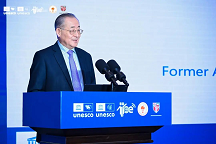 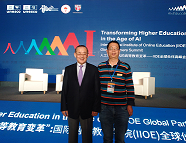 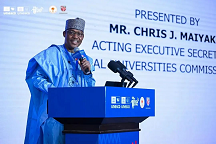
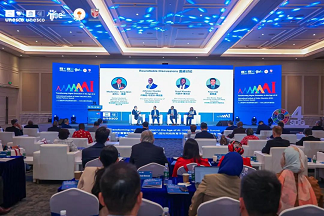 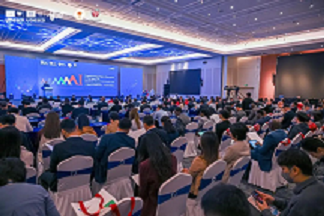
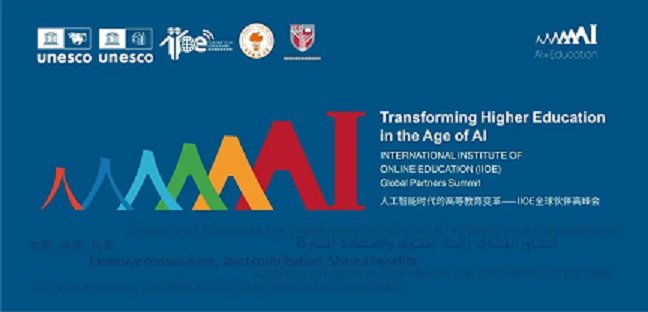
|